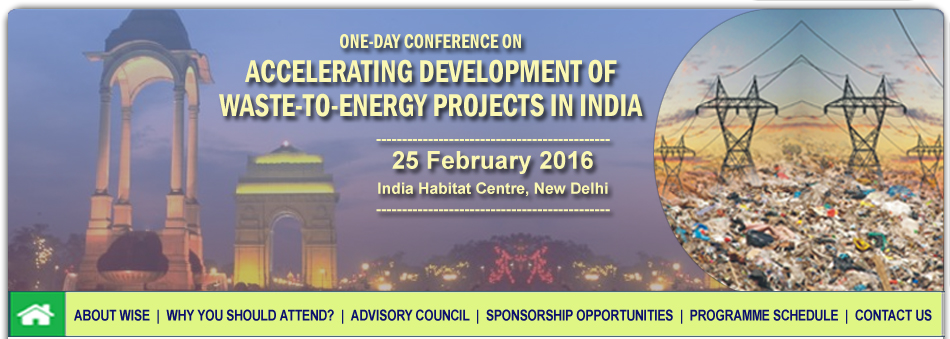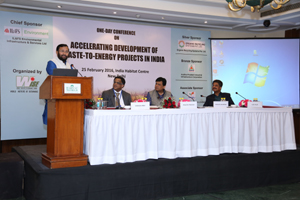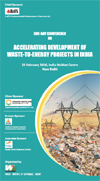
|
|
|
|
|
Chief Sponsor |
||
|
|
|
|
|
|
|
Silver Sponsor |
||
|
||
Bronze Sponsor |
||
|
||
Associate Sponsor |
||
|
||
|
|
|
|
|
Conference Brochure |
||
|
|
|
|
|
|
|
|
|
|
|
|
Organised By |
||
|
|
|
|
|
|
|

WISE in association with IL&FS Environmental Infrastructure & Services Ltd. organized a one-day conference and exhibition on Accelerating Development of Waste-to-Energy Projects in India, in New Delhi on 25 February 2016. The main aim of the conference was to discuss and debate on the multiple issues and challenges faced by the nascent waste-to-energy (WtE) sector in the country and explore various pathways to take it forward.
Major Outcomes of the Conference
- The state electricity regulatory commissions (SERCs) should determine the tariff for sale of electricity from MSW-based power projects to DISSCOMS. CERC regulations on municipal solid waste (MSW) tariff setting may be considered by the SERCs for awarding the tariff at the state level.
- In addition to the tariff, the Urban Local Bodies shall also provide appropriate tipping fee to the developers for processing of the waste.
- There should be payment guarantee mechanism for procurement of power from distribution licensees.
- Different types of support such as viability gap funding (VGF), capital subsidy, etc, should be made available depending upon the case.
- MSW-based power projects should be considered as environmental management projects and social projects, rather than mere power projects.
- A separate RE purchase obligation is needed to ensure offtake of power from these projects.
- Centralized and decentralized waste processing technologies with or without energy recovery should be considered for integrated waste management.
The conference was inaugurated by Shri Prakash Javadekar, Hon. Minister of State (Independent Charge) for Environment, Forest and Climate Change, Government of India, who was the Chief Guest. Speaking at the inaugural session, Mr Javadekar said that current municipal waste processing practices are ‘contract-driven’ and not subject to proper assessment with regard to technology and processes. The Minister said that to tackle this major problem, the Department of Science and Technology, Govt of India, has established a separate cell, which will coordinate with the network of scientific establishments to verify, check, and assess the appropriate technologies for processing the waste. Expressing concern over the fact that 86% of sewage was going untreated and entering water bodies causing water pollution and related health problems, he said that ‘responsible’ waste management is the need of the hour. The Minister was hopeful that the new draft Solid Waste Management Rules, 2015, which envisages facilitation, construction, operation and maintenance of solid waste processing facilities, and adoption of appropriate technologies would help solve the untreated sewage problem and thereby reduce the carbon footprint.
The Minister also said that the government has initiated some unique programmes for countering the waste menace in the country. The measures include introduction of waste segregation and waste management in schools, and plans to felicitate the ‘unrecognized’ class of workers such as ragpickers for their invaluable role in segregation of waste.
Praveen Prakash, Joint Secretary, Ministry of Urban Development (MoUD), GoI, who was the Guest of Honour at the inaugural session said that the Union Government has set a target of generating 700 MW of energy from waste by 2019. To achieve this, the government has taken concrete steps such as mandatory purchase of power by distribution companies from cities generating power from waste; mandatory co-marketing of city compost by fertilizer marketing companies which would receive an incentive of Rs.1500/tonne of compost; verification of composting by all companies marketing urea; and compulsory use of treated waste water for thermal plants located within an 80 km radius of sewage treatment plants.
Also present at the inaugural session were G M Pillai, Founder Director General, WISE, and Mahesh Babu, Managing Director, IL&FS Environmental Infrastructure and Services Ltd.
Panel discussions on ‘Integrated Approach to Waste-to-Energy Projects in India: Way Forward’, and ‘Public Private Partnership in promoting Waste-to-Energy Projects’ were other major highlights of the conference. Distinguished personalities participating in the panel discussion included Dr Puneet Kumar Goel, Commissioner, South Delhi Municipal Corporation; V K Jain, Director & NPC, MNRE, GoI; Suhas Bhand, Chairman, Organic Recycling Systems Private Limited, Navi Mumbai; S R Pandey, Legal Advisor, Gujarat Electricity Regulatory Commission; D B S S R Sastry, GM, Ramky Environmental Engineering, Hyderabad; and Rajkumar, Director, InfraEn (India) Pvt. Ltd, Bengaluru.



